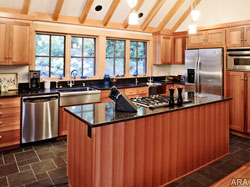
(ARA) – Whether you seek soft, elegant hues to contrast a dark room or striking grain patterns and rich colors for a bold look, exotic hardwood floors, cabinets, furniture and trim can help create eye-catching interiors for nearly any decor.
In recent years, though, some homeowners have shied away from hardwoods because of concerns with illegal logging and deforestation. Thanks to responsible forestry practices, sustainable forestry certification and manufacturer innovation, visually appealing hardwoods can now be part of an environmentally conscious home.
“By knowing what to look for, homeowners can have the natural warmth and timeless appeal of exotic hardwoods with the peace of mind that they come from responsible sources,” says Eric Anderson of Weyerhaeuser. “The wood species, how and where the trees are grown and harvested, and how the wood is processed are all important factors.”
One increasingly popular exotic hardwood is Lyptus – a eucalyptus hybrid grown on plantations in Brazil. Lyptus plantations include a mosaic of eucalyptus and native tropical forest on land previously used for agriculture and grazing. This practice helps replace forestlands previously lost in decades past.
Lyptus grows fast, reaching maturity within 14 to 16 years of planting. By comparison, temperate species can take decades to mature. Rapid growth helps to meet the increasing demand for wood products and still ensure a continuing supply of hardwood for future generations.
“A Lyptus plantation can produce up to 30 times more volume of wood per acre each year than an unmanaged temperate forest,” adds Anderson. “Plantations help foresters reduce the land footprint needed to create wood products.”
An additional benefit of active plantation management is that foresters manually prune the trees while they grow. As a result, the logs that come into the mill are more uniform and have fewer knots. A high percentage of the wood can be made into finished products, making efficient use of natural resources.
While choosing hardwoods with environmentally responsible features is appealing to many homeowners, the end choice often still comes down to how good they look in the home. “People regularly say they first notice Lyptus because of its warmth and beauty,” says Anderson. “When they learn it also has a good environmental story, it becomes a natural choice.”
The natural color of Lyptus can brighten interiors and create an open feeling in smaller rooms, while a dark stain can add a touch of sophistication. Homeowners can also easily mix-and-match hardwood finishes to create visual interest.
Regardless of which hardwood catches your eye, make sure it has all the performance characteristics to make your home warm and inviting for years to come. Durability is a key consideration. Hardwoods with high hardness ratings (greater than that of red oak – a standard common benchmark for hardness) are better suited to withstand the scratches and dents of everyday life for long-lasting beauty.
For more information on Lyptus hardwoods, visit www.lyptus.com or call (800) 320-9720. Many cabinet, flooring and furniture dealers across the country are also familiar with Lyptus and can show you a range of product options.
Courtesy ARAcontent





